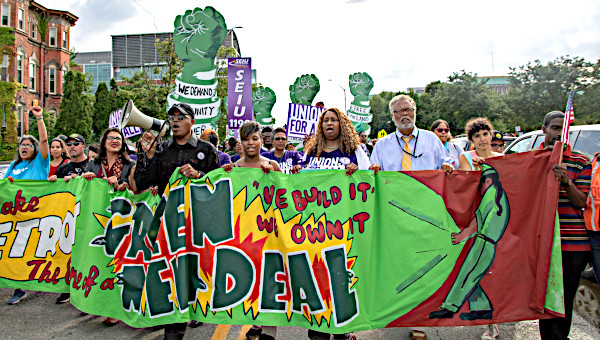






In a renewed effort to combat climate change, Democrats, led by Representative Alexandria Ocasio-Cortez and Senator Ed Markey, are advocating for the Green New Deal, which aims to eliminate the U.S. carbon footprint by 2030. This ambitious proposal has garnered support from five Democratic presidential hopefuls: Kamala Harris, Cory Booker, Kirsten Gillibrand, Elizabeth Warren, and Bernie Sanders. The plan seeks to transition the nation to 100% renewable energy, although it does not explicitly call for the elimination of fossil fuels [455af414].
The Green New Deal has been met with enthusiasm from House Speaker Nancy Pelosi, who welcomes the proposal, emphasizing its potential to address both economic and environmental justice. Ocasio-Cortez has highlighted the importance of integrating these two aspects, arguing that climate action must also focus on equity and justice for marginalized communities [455af414].
The plan includes provisions for existing nuclear power but explicitly blocks the construction of new nuclear plants, reflecting a cautious approach to energy diversification. However, critics of the Green New Deal have raised concerns about the potential costs, predicting that the initiative could run into the trillions of dollars [455af414].
In conjunction with this legislative push, the Green New Deal Network is launching a national tour to promote bold federal climate action. This tour features prominent champions like Senator Ed Markey and Representatives Ilhan Omar, Jamaal Bowman, Cori Bush, and Summer Lee, aiming to showcase widespread support for decarbonizing the U.S. economy and creating millions of jobs. Advocates argue that the Green New Deal is essential for repairing the damage caused by fossil fuel-driven climate change and providing resources for communities to thrive [976f0731].
The tour kicked off on November 5th in Dearborn, Michigan, where local politicians and activists rallied to promote the Green New Deal. The event featured performances by punk mariachi band Pancho Villa’s Skull and speeches from U.S. Representatives Rashida Tlaib and Debbie Dingell. Attendees emphasized the need for cleaner public transportation and better housing initiatives, particularly in communities facing high pollution levels and health issues like cancer and asthma [bac7bd9f].
In a related effort, Green Day will headline a global climate concert in San Francisco, co-hosted by the Recording Academy and backed by the United Nations Human Rights. The concert aims to raise awareness of climate inequalities, with proceeds going to climate justice initiatives and a MusiCares fund for musicians affected by climate change [4021aeb5].
Renowned primatologist Jane Goodall will deliver a keynote address at the Starmus Festival in Slovakia, focusing on the theme of hope amid climate challenges. Goodall emphasizes the importance of local action and the role of young people in driving change, highlighting the need to address issues like poverty, climate change, and biodiversity loss [1a475eb5].
Dr. Ayana Elizabeth Johnson, a marine biologist and climate activist, is shifting the narrative around climate action from pessimism to cautious optimism. In her upcoming book, "What if We Get It Right?", she explores promising climate solutions through interviews with leaders across various fields, advocating for a positive approach to climate discourse [62e48c31].
Adenike Oladosu, appointed as Education Cannot Wait's new Climate Champion, calls for integrating climate action with education initiatives to address the challenges posed by climate change on schooling. ECW has issued a global appeal for $150 million to support children impacted by climate-related crises, emphasizing the urgent need for climate-resilient educational infrastructure [12e2e65e].
In addition to these efforts, Alexandria Shaner discusses Jeremy Brecher's book, "The Green New Deal from Below," which emphasizes grassroots initiatives for climate action. Brecher highlights the importance of local movements led by diverse coalitions, including unions and community groups, to counteract fossil fuel interests. The book reflects on the Green New Deal's origins and its vision to unite climate protection with social justice, advocating for a participatory approach to democracy and social change [e0f22026].